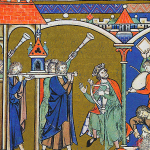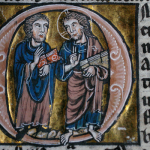Shrewsbury, England, Apr 7, 2015 / 02:03 am (CNA/EWTN News).- It is more important than ever for the British people to hear about Jesus Christ, who reveals the dignity and identity of every person, Bishop Mark Davies of Shrewsbury said in his Easter Sunday homily. “It is in the light of His Cross and Resurrection that we have long recognised what a human being is worth and what we should truly value in our lives,” he said April 5. Christianity has long been Britain’s “most important formative influence” ever since the “savage people”, he said quoting historian Sir Arthur Bryant, converted to “Christ’s gentle creed of love and sacrifice and the revolutionary belief … that every individual was a soul of equal value.” Values come down to the question, “why do we believe that every human being has innate worth and is endowed with equal rights and dignity?” That answer lies in the Christian faith which proclaims that our identity lies in the glory of the Risen Christ, not political rhetoric. It is not the role of bishops to “formulate policies” or to take a “political stance” he said, as England prepares for a General Election to be held May 7. “This is the task and vocation of politicians who have a vital and necessary vocation.” Rather, the bishops' duty is to allow “the gentle light of Christ” to shine on all society and the questions that confront it. “In His clear and gentle light, we see why it is we must care about each other and not see any human being simply in terms of economics or usefulness; why we must safeguard the value of every human life born or unborn, young or old, sick or healthy; why we must protect the family as the most precious cell of society where each man and woman is ‘nurtured.’” Bishop Davies' comments come as the English government seeks to regulate a set of “fundamental British values” to be taught to school children. “It has left many uneasy because our values cannot be arbitrarily formulated by any passing generation of politicians even if they have the best intentions,” he noted. “Our values will always emerge from what we truly believe about ourselves and beg the question why do we believe that every human being has innate worth and is endowed with equal rights and dignity?” The government made the requirement after the “Trojan Horse” scandal -- a plan by a group of Muslim extremists to infiltrate Birmingham schools with radical ideology. Since then, the education standards watchdog Ofsted has been investigating schools and reviewing them for their adherence to the set of values created by the state which includes questioning children as young as 10 about “diverse sexual lifestyles.” St. Benedict’s Catholic School in Suffolk was marked as a school that “requires improvement” after students were deemed “unaware of the dangers of radicalization and extremism,” even though it is ranked as the 56th best school in all of England by another school rating system. Bishop Davies recalled Pope Francis’ comments to the European Parliament last November when he said that only when Europe can harvest the fruits of its religious roots will it be “immune to the many forms of extremism spreading in the world today.” He added “in other words, it is by faith in what a human being is, rather than by what any political leader says we are, that human rights are truly safeguarded.” The same point had been made by Benedict XVI during his 2010 address to British politicians, when he said that “If the moral principles underpinning the democratic process are themselves determined by nothing more solid than social consensus, then the fragility of the process becomes all too evident – herein lies the real challenge for democracy.” Bishop Davies reflected that “Pope Benedict had himself seen in Germany a violent, racist and anti- Christian movement come to power not by the bomb or the bullet but through the democratic process. He concluded that the world of secular rationality and the world of religious belief need one another if the good of our civilization is to be secured.” The bishop concluded that it is in Christ that “we will always be able to see what we must value and what upholds human dignity and flourishing in every generation.” “It is this light which has guided our nation from its beginnings and continues to guide all those who today come to know Christ Jesus our Lord.” Read more
















